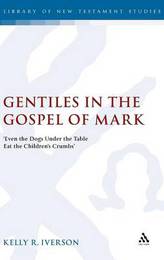
|
Gentiles in the Gospel of Mark: 'Even the Dogs Under the Table Eat the Children's Crumbs'
Hardback
Main Details
| Title |
Gentiles in the Gospel of Mark: 'Even the Dogs Under the Table Eat the Children's Crumbs'
|
| Authors and Contributors |
By (author) Kelly Iverson
|
| Series | The Library of New Testament Studies |
|---|
| Physical Properties |
| Format:Hardback | | Pages:224 | | Dimensions(mm): Height 234,Width 156 |
|
| Category/Genre | Biblical studies |
|---|
| ISBN/Barcode |
9780567031310
|
| Classifications | Dewey:226.306 |
|---|
| Audience | | Undergraduate | | Postgraduate, Research & Scholarly | | Professional & Vocational | |
|---|
|
Publishing Details |
| Publisher |
Bloomsbury Publishing PLC
|
| Imprint |
T.& T.Clark Ltd
|
| Publication Date |
10 January 2007 |
| Publication Country |
United Kingdom
|
Description
This groundbreaking study argues that, in the Gospel of Mark, Gentiles are recipients of Jesus' compassion and are typically depicted as desperate individuals who exhibit faith and understanding. Mark's arrangement of the sequence of Gentile episodes is progressive and envisions a theological reversal in the kingdom of God, a re-prioritization in the proclamation of the gospel message that coincides with the death of Jesus. After receiving Gentiles in the Jewish homeland (3:7-12), the Markan Jesus initiates four excursions into Gentile territory. The first journey (5:1-20) is preparatory and opens the door for future ministry in Gentile regions. Jesus symbolically cleanses the land and the healed demoniac becomes the first missionary to Gentiles. The second journey (6:45-52) ends prematurely when the disciples fail to understand the Gentile mission, leading inexorably to the third journey where the relationship between Jews, Gentiles, and the kingdom of God becomes the focal point of the narrative. Although the Jews are first, the Gentiles are not excluded from the kingdom. On the fourth journey the reader senses a subtle re-prioritization in the kingdom as an event on Gentile soil occurs before its parallel counterpart on Jewish soil, reversing an established narrative pattern in Jesus' ministry. Iverson shows how the theological reversal gains clarity when the narrative shifts to Jerusalem. The tearing of the temple curtain marks the dawn of a new era and links the temple and Gentile themes. Through Jesus' obedient self-gift, he becomes the new temple providing universal access to God for all people's depiction of the centurion is a narrative signal that the kingdom has been passed to Gentiles according to the divine plan. The Jews have not been excluded, any more than the Gentiles were when Israel was first. Mark's theological reversal looks proleptically beyond the story line to the completion of the Gentile mission by the followers of Jesus.
Author Biography
Kelly R. Iverson is a graduate of Iowa State University, Dallas Theological Seminary, and The Catholic University of America, USA.
|